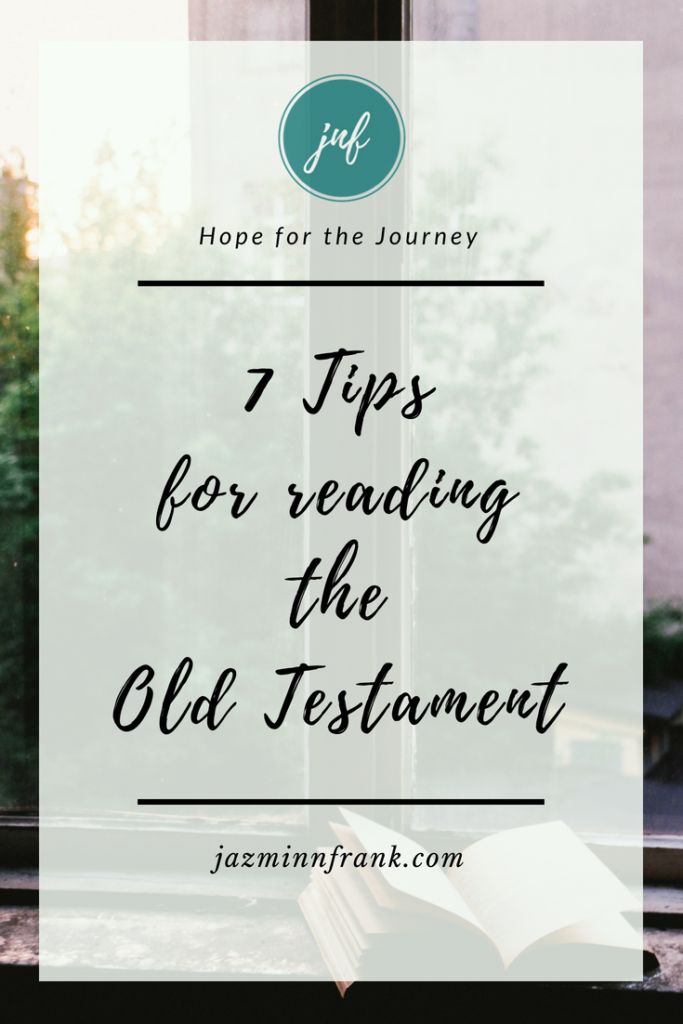**Some of the links below are affiliate links*, meaning, at no additional cost to you, I will earn a commission if you click through and make a purchase. Read my full disclosure here.**
Growing up in the church, I’ve had numerous encounters with the Bible. I’ve read bits and pieces, and several years ago I read through it once or twice following different reading plans and using the One Year Chronological Bible. However, I’ve never read the Bible cover to cover.
I remember in elementary school when I had just started reading my big girl Bible. Like any book and the children’s Bible’s I’d read, I started on the first page. I think I only made it through a few chapters before I fell of the reading bandwagon, because, let’s be honest, the Old Testament isn’t always easy to understand whether you’re ten or a hundred and ten.
We’re okay in Genesis and most of Exodus because the stories about the flood and the plagues are interesting and exciting. But once we hit the books about the Law or try to wrap our minds around what the Prophets are saying, it’s really easy to get bogged down and discouraged to the point that we just stick to the books we understand, or we just skip the Old Testament all together.
We claim that it really doesn’t matter as much as the New Testament anyway.
However, when we do that, we’re missing out on something really beautiful: the fullness of God’s story.
My hope is that this post encourages you to dive back into the Old Testament, to read it in it’s entirety and actually enjoy what you’re reading. But in order to do that, there are a few things we need to understand about the Old Testament:
The Bible is God’s Story
Often when we approach Bible reading, we do it from the mindset of “What am I going to get out of it?” We want hope and guidance and wisdom in how to survive and thrive in this crazy world. Sometimes we even read the Bible out of obligation, because it’s the “good Christian” thing to do.
But here’s the reality: God has given us a very precious gift, and that is His story written down so that we can get to know Him.
He has inspired humans to write down an account of His story from the beginning of time to the end of time when the world and God’s relationship with humanity is restored to what He originally intended it to be. And because the Bible is God’s story, every piece of Scripture helps introduce us to the heart, character, and person of God. If we skip over pieces, we miss out on aspects of God that He wants us to know.
The Old Testament sets the foundation of the Story and introduces us to a God who is seeking to restore humanity to Himself. It also sets the stage for Jesus and why He came. By allowing ourselves to linger in the Old Testament, it actually brings the New Testament to life in a deeper, much more powerful way.
The Old Testament is not chronological
One thing that often trips me up, and maybe you too, is that the Old Testament (and the truthfully the whole Bible) isn’t organized chronologically. Events do not appear in Scripture in the order they happened, which can often leave us more than a little confused about what’s going on.
While we don’t have time today to go super in depth about how the Old Testament is organized, I do want to give you a quick break down:
- Pentateuch. This section includes the first five books of the Bible (Genesis through Deuteronomy). It gives an account of Creation, God’s covenant with Abraham, and follows Abraham’s decedents as they become slaves in Egypt. This section ends with Israel being freed from slavery, receiving the Law, and preparing to enter into the promised land.
- History. As it implies, this section recounts Israel’s history of entering the Promised Land, the rising and falling of the Judges, the various kings of Israel, and Israel’s exile.
- Poetry (also known as Wisdom Literature). Job, Psalms, Proverbs, Ecclesiaties, and Song of Solomon make up this section. These books feel vastly different than the previous sections of the Bible and explore both the beauty and the challenge of living for God.
- Prophets. The Old Testament closes with words about what God will do in the future–about Israel’s exile and about the King that would restore Israel. This section can be really hard to follow because the prophets are removed from the historical context they were written in, but they set the stage for the coming of Christ in the New Testament.
(If you want to look a little deeper at the larger picture of the Old Testament, I found this video super helpful.)
You will not understand everything the first time you read it
God’s word is rich and the more we read it, the more we lean into Him and ask Holy Spirit for understanding, the more we will be able to grasp about His story. As we read all the pieces of the Bible, we’ll begin to see connections, recurring themes, and get better acquainted with the heart of God. But we won’t get it all right away, but don’t let that discourage you from reading and enjoying this part of the Bible.

7 Practical Tips to Help You Enjoy the Old Testament
Understanding the role and structure of the Old Testament has gone a long way in helping me fall in love with the Old Testament as a whole. As I’ve continued to intentionally open God’s Word, I’ve found myself getting more and more excited about Scripture.
Over time I’ve learned a few practical ways to engage with the Old Testament that have helped me enjoy what I’m readying, and hopefully they will help you as you continue to grow in your love and understanding of God’s Word:
1. Read slowly. My current reading speed is about one or two chapters a day. At this speed it will probably take me all year to make it through the Old Testament, but I’m finding that as I slow down and focus on that one chapter, I’m able to dig a little deeper. Don’t try to power through. Allow yourself to the space and time to slow down and enter into whatever you’re reading.
2. Ask Questions. One of the most beneficial things I’ve learned is to enter into conversation with God as I read. I ask questions and write them out in my Bible and I take time to listen for God’s answers. In the process, I’ve not only grown in my understanding of Scripture, but I’ve also grown in my prayer life as I actively converse with God about His word.
3. Use a Bible Study journal. This is something new I started this year, and actually, I’m finding it really works for me. For years I read the Bible very fluidly, recording thoughts and insights in my journal or the margins of my Bible, but in January I decided I wanted to try something different, so I changed things up and got a Give Me Jesus Journal. This journal is designed for intentional Bible study, with space to record insights and reflection questions that prompt me to apply what I read. If you like structure in your reading, or you’re just ready to try something a little different, I highly recommend trying one of these journals.
4. Read with someone else. Life is often more enjoyable when we have someone to share it with, and the same can be true when it comes to Bible reading. Find yourself a buddy and pick a book of the Bible to read, then come together and talk about what you learned. This creates a level of accountability and allows you to dig a little deeper into God’s Word than you might be able to do on your own.
5. Use a reading plan. If we’re going to enjoy the Old Testament, we actually need to sit down and read it. Developing the habit of reading the Bible can be a challenge if we’re not naturally self-disciplined. When I first started reading the Bible for myself, I would use a reading plan. There are a ton out there to choose from (The Bible Project and Bible Gateway are just a few of the great resources for free reading plans). Each day of the plan gives you an assigned passage to read and keeps you on track to read through the Bible in it’s entirety.
6. Use your imagination. After #2, this one has been the most influential in helping me understand and enjoy the Old Testament. Allow God’s word to engage your imagination. Put yourself into the story, watch it play out in your mind’s eye. Picture the people you’re reading about, picture God and how He interacts with people. The possibilities are endless and the impact leads to a more enjoyable experience with the Old Testament as the words on the page come to life.
7. Ask God for a passion for His story. When it comes down to it, God is ultimately the one who can help us enjoy Scripture. So go ahead and ask Him. Tell Him when things feel boring and hard to understand and ask Him to help you enjoy what you are reading.
Reading the Old Testament may feel boring and tedious at first, but when we recognize that this section of the Bible is God’s story too, and we begin to take practical steps to engage in His word, we will find that those sections we once saw as boring are actually really enjoyable.
What part of the Bible is hardest for you to understand? What practical step will you take today to help you read the Old Testament?
Live in His love!

Related: Engaging in God’s Word: The Bible as a Conversation
*Disclosure: Some of the links are affiliate links, meaning, at no additional cost to you, I will earn a commission if you click through and make a purchase.

Sign up to get access to reading plans, Bible study guides, Scripture memory cards and more!


I’m reading the Life Application Bible – New Living Translation this year and just finished the Old Testament. The notes were such a huge help in understanding and helping me put things in context. This is my 12th year to read the Bible – using various plans or versions and this one has been transformational. Thanks for this important reminder of the value of spending time in the Old Testament as well as the New. Blessings!